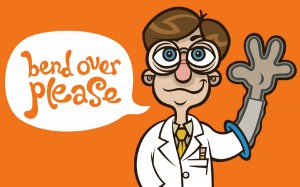 Whenever I say to people, “I must start thinking about my next topic for my 10-4 Magazine article,” inevitably the person says to me, “You must have done a column on hemorrhoids by now.” Well, to date, I have not. I usually try to write something that goes along with the season or is in the news, but hemorrhoids are a problem for all seasons and times, so it just seems like a good time to talk about them. This is one of those problems that most people don’t want to discuss until they are so uncomfortable they just can’t avoid the conversation any more. Perhaps this bit of information can help you prevent them, or treat them, if it’s already too late.
Whenever I say to people, “I must start thinking about my next topic for my 10-4 Magazine article,” inevitably the person says to me, “You must have done a column on hemorrhoids by now.” Well, to date, I have not. I usually try to write something that goes along with the season or is in the news, but hemorrhoids are a problem for all seasons and times, so it just seems like a good time to talk about them. This is one of those problems that most people don’t want to discuss until they are so uncomfortable they just can’t avoid the conversation any more. Perhaps this bit of information can help you prevent them, or treat them, if it’s already too late.
Hemorrhoids (also called piles) are veins in the anus and rectum (the end of the digestive tract; the place where the waste goes out) that swell and can be painful and/or itchy. Most people over 50 years old have them at some point, but younger people can also get them. A person can have internal hemorrhoids, ones that stay inside, or external hemorrhoids, ones that get pushed out of the rectum with increased abdominal pressure – like when having a bowel movement, for example. Every now and then they may flare up, getting more irritated than usual, and cause discomfort. In some people, the hemorrhoids can even form large blood clots that can be very painful and make it almost impossible to sit down.
Anyone who has increased pressure in their lower abdomen can get them. Pregnant women commonly have hemorrhoids because of the pressure from the baby. But any pressure can do it – straining to go to the bathroom in the person with constipation, being overweight and having a big belly, or sitting much of the time (which explains why truckers get them more often than other people who have jobs that involve more walking and physical activity). The Centers for Disease Control and Prevention has even documented that hemorrhoids are more of a problem among truckers than people in other occupations (what a surprise). If you have itching and a burning sensation in the anus, than you probably have one. Some people will also see some bright red blood when they wipe after having a bowel movement if one of the swollen blood vessels has broken.
 There are a few things that you can do to help prevent hemorrhoids. Preventing constipation is important. In order to do so, a person must eat lots of fiber (fruits – prunes are a particular favorite – vegetables, whole grains) and drink plenty of fluid. This change in diet is extremely helpful for any number of things – preventing diabetes, high blood pressure, losing weight. You should also avoid foods that you find constipating. For some people those will be things like cheese and bananas, but this can vary from person to person.
There are a few things that you can do to help prevent hemorrhoids. Preventing constipation is important. In order to do so, a person must eat lots of fiber (fruits – prunes are a particular favorite – vegetables, whole grains) and drink plenty of fluid. This change in diet is extremely helpful for any number of things – preventing diabetes, high blood pressure, losing weight. You should also avoid foods that you find constipating. For some people those will be things like cheese and bananas, but this can vary from person to person.
If you take medicines on a regular basis for other health problems, check to see if constipation is a side effect of that medication. If it is, ask your health care provider if there is any possibility of changing that certain medication to one that doesn’t cause constipation. There are medicines you can buy over the counter, without a prescription, that increase the amount of fiber in your diet – fiber powders and pills. Other medicines, called stool softeners, do just that – they make it easier to go to the bathroom and have a bowel movement without lots of effort and strain.
So, what can you do if you already have hemorrhoids? Again, there are over-the-counter remedies that you can buy in a pharmacy or box store to give you temporary help until the flare-up settles down. Some medicine comes in cream form, some in medicated pads. Sitting in a tub full of warm water can also be very soothing. Your hemorrhoids will usually feel better within a week or so. A special seat cushion called a “donut” can also relieve the pressure and discomfort of hemorrhoids while you are sitting. Again, you can buy this without a prescription. It comes in different sizes and many are inflatable so it can be adjusted to meet your comfort needs.
If you’ve tried all of these things but still have discomfort, or if you are bleeding, you will definitely need to see a health care provider who can examine you and perhaps send you to a specialist to look directly into the anus/rectum/colon to make sure that it is nothing more serious than just a hemorrhoid. Once it’s been determined that there’s not another illness causing your problem, there are surgical procedures that can be done to get rid of the hemorrhoids. However, a word of caution: if the factors that caused you to have the hemorrhoids in the first place aren’t taken care of, there is a chance you will get them again.
We have come to the proverbial end, so to speak, of this somewhat uncomfortable topic. I hope it wasn’t too hard for you to get through, but if you are one of the unlucky people suffering from hemorrhoids, you should take care of them. And, more importantly, address the issues that caused them in the first place so they don’t come back. Life is too short to waste time feeling miserable! Here’s to pain-free and itch-free trucking so you can continue “sitting pretty” in the seat for years to come.
~ Dr. Norma Stephens Hannigan is a Doctor of Nursing Practice who teaches at Columbia University in New York, NY. Dr. Norma has treated many truck drivers at the various clinics she has worked in over the years. She currently writes for 10-4 Magazine from her home in Newburgh, New York.
